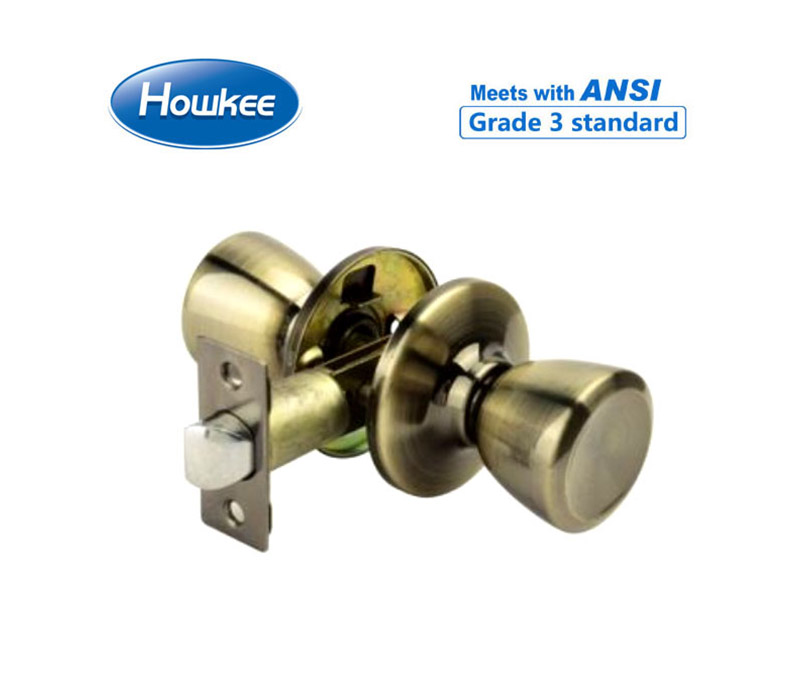Comparing different types of door knobsets: Tubular vs. cylindrical
When it comes to choosing door knobsets for your home, you may come across different types, each with its own characteristics and features. Two commonly encountered types are tubular knobsets and cylindrical knobsets. While both serve the basic function of allowing you to open and close doors, they have some notable differences. In this article, we will compare tubular and cylindrical knobsets to help you make an informed decision for your home.

1. Design and Construction:
Tubular Knobsets: Tubular knobsets consist of a cylindrical housing that contains the internal mechanisms, such as the latch and lock components. The knob itself attaches to the cylindrical housing, giving it a seamless and streamlined appearance. Tubular knobsets often have a more classic and traditional design aesthetic.
Cylindrical Knobsets: Cylindrical knobsets, also known as cylindrical locks, feature a more straightforward design. The knob and the latch mechanism are incorporated into a single cylindrical unit. Cylindrical knobsets have a simpler and more modern appearance compared to tubular knobsets.
2. Installation:
Tubular Knobsets: Tubular knobsets are relatively easy to install and are compatible with standard door preparations. They typically come with a mounting plate that fits into a cutout in the door, with screws securing the knobset in place. Tubular knobsets can be installed on both left-handed and right-handed doors.
Cylindrical Knobsets: Cylindrical knobsets also offer straightforward installation. They require a cross-bore hole to be drilled through the door, where the latch and lockset are inserted. Cylindrical knobsets can be installed on both left-handed and right-handed doors by simply reversing the orientation of the latch.
3. Functionality and Security:
Tubular Knobsets: Tubular knobsets are commonly used for interior doors where privacy is desired, such as bedrooms and bathrooms. They often feature a simple locking mechanism that allows for privacy without the need for a key. However, tubular knobsets may not provide the same level of security as cylindrical knobsets, as they are primarily designed for privacy rather than high-level security.
Cylindrical Knobsets: Cylindrical knobsets are often used for exterior doors and provide enhanced security features. They typically include a key-operated cylinder for locking and unlocking the door. Cylindrical knobsets are more suitable for applications where security is a primary concern, such as entry doors or doors leading to the outside of the building.
4. Durability and Maintenance:
Tubular Knobsets: Tubular knobsets are generally durable and designed to withstand regular use. They are constructed with quality materials such as solid brass or stainless steel, ensuring longevity. Maintenance typically involves regular cleaning and occasional lubrication of the internal mechanisms to ensure smooth operation.
Cylindrical Knobsets: Cylindrical knobsets are also built to be durable and resilient. They are often made from robust materials to withstand external elements and potential attempts at forced entry. Proper maintenance includes regular cleaning, lubrication of the internal components, and periodic inspection of the lock cylinder and key.
5. Price Range:
Tubular Knobsets: Tubular knobsets are generally more affordable compared to cylindrical knobsets. They provide an economical option for homeowners who want to upgrade their door hardware without a significant financial investment.
Cylindrical Knobsets: Cylindrical knobsets tend to be slightly more expensive due to their enhanced security features. The inclusion of a key-operated cylinder contributes to the higher price range. However, the cost difference may vary depending on the specific brand, design, and additional features of the knobset.
In summary, both tubular and cylindrical knobsets have their own advantages and suit different applications. Tubular knobsets are well-suited for interior doors, offering a classic design and privacy functionality. Cylindrical knobsets, on the other hand, are more suitable for exterior doors where security is a priority. Consider your specific needs, preferences, and the intended location of the knobset when making your decision.


